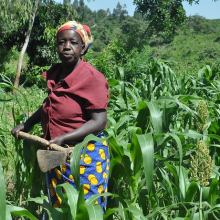
An agroecological revolution has been working its way across the African continent, helping to secure farmers’ livelihoods, new research shows. The Oakland Institute, a US-based policy think tank, has released 33 case studies that shed light on the tremendous success of agroecological agriculture in Africa in the face of climate change, hunger, and poverty. “These case studies provide irrefutable facts and figures on how agricultural transformation – respectful of the farmers and the environment – can yield immense economic, social, and food security benefits while ensuring climate justice and restoring soils and the environment,” said Anuradha Mittal, Executive Director of the Oakland Institute. The case studies present a large variety of techniques and practices used to achieve these benefits: plant diversification; intercropping; the application of mulch, manure or compost for soil fertility; the natural management of pests and diseases; agroforestry, the construction of water management structures and many other success stories. “We are told over and over that Africa needs a new Green Revolution, more synthetic fertilizers, and genetically modified crops,” said Frederic Mousseau, who coordinated the research. “These case studies debunk these myths and highlight the multiple benefits of agroecology, including affordable and sustainable ways to boost agricultural yields while increasing farmers’ incomes, food security, and resilience.” Published just a few days ahead of the United Nations Climate Change Conference in Paris, these case studies show how agroecology can contribute to stopping environmental degradation and fighting climate change. Agriculture, forestry, and other land use are responsible for at least a quarter of all greenhouse gas emissions from human activity. According to the International Panel on Climate Change, emissions from these sectors have almost doubled over the past 50 years. The use of synthetic fertilisers in industrial agriculture is the fastest growing source of agricultural greenhouse gas emissions. The Oakland Institute therefore calls for a urgently needed shift towards agroecological practices, a view supported by many farmers and civil society organisations in Africa. (ab)
